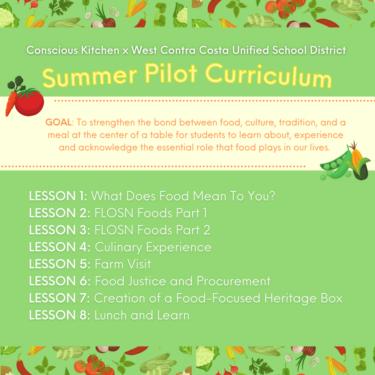Food is such an important part of each of our lives: it not only gives us energy and sustains us, but also holds larger cultural and social meaning. This summer, Conscious Kitchen collaborated with West Contra Costa Unified School District to pilot a Conscious Kitchen Ambassador Program curriculum, which sought to encapsulate the many different meanings of food for students.
Kelly Cary, a teacher at WCCUSD, implemented the pilot program at two schools this summer. “Your voice is your power” is one of Kelly’s favorite teaching mantras, an idea underlying the mission throughout this pilot process. “Over the 8 weeks that the curriculum was implemented, we took a journey around how food impacts these students’ entire lives,” Kelly said.
The CK pilot program began with inviting students to share their favorite “food memories,” times when food has played an important role in an experience, and share family that mean something special.
From there, students explored the importance and implications of eating Fresh, Local, Organic, Seasonal, and Nutritional (FLOSN) foods, and applied newfound knowledge to their own favorite foods. Students also virtually toured California’s Frog Hollow Farms with Farmer Al, cooked up their favorite culturally-relevant dishes in the kitchen with classmates (and even made full lunches!), and explored the meaning of food justice.
With each new topic, the program sought to maintain a safe environment for students to develop and express their ideas and opinions. Much of the time was spent in open discussion with students, asking for their input, feedback, and experiences.
At the end of the 8 weeks, students created and presented heritage boxes, containing meaningful pictures and items that represent who they are as a person. The heritage boxes were a great way to honor students’ identities and cultures, while showcasing the different roles food can represent within those identities.
Kelly explained that she wants students to gain “a true understanding of everything that goes into food,” including where food comes from and the impact different ingredients have on health and the Earth. The program honors all backgrounds, dietary preferences, food experiences, and levels of access to both information and ingredients, without shaming or judging any student for what they eat. Its aim is for students to come away understanding how to make better choices where and when they can, and to try to eat some foods more than others to feel and function better themselves, and to support a resilient Earth.
For the upcoming school year, this curriculum will be expanded to reach more students across WCCUSD about a variety of food-focused topics. Kelly’s ultimate hope is that the program “explodes across the whole country,” educating students everywhere about the importance of healthy food grown, raised and prepared with integrity. Students deserve a better understanding of food and its impact on our bodies and the environment — and Conscious Kitchen will continue to work toward improved food literacy in the classroom, dining hall and beyond.
